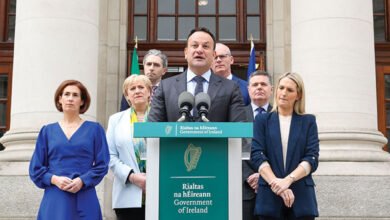New EU Directive to require embodied carbon of buildings regulation

The Revised Energy Performance of Buildings Directive aims to increase rates of retrofitting and will require member states to regulate the embodied carbon of buildings for the first time.
The agreement between the European Parliament and the Council of the European Union was reached on 7 December 2023 and states that all new buildings should be zero emission as of 2030 and new buildings occupied or owned by the public sector must be zero emission by 2028.
There is no longer an obligation to scale up the energy performance of buildings via minimum levels to be achieved by individual buildings. Instead, member states will be obligated to ensure a reduction in the average primary energy used in residential buildings of at least 16 per cent by 2030 and in a range between 20 and 22 per cent by 2035.
On minimum energy performance requirements, the agreement envisages that member states renovate the 16 per cent worst performing non-residential buildings by 2030 and the worst performing 26 per cent by 2033. The aim is to completely discontinue the use of fossil fuel boilers by 2040 and stop subsidising standalone fossil fuel boilers as of 2025.
In line with the European Parliament’s proposal, member states must set up one-stop shops, i.e. technical assistance facilities on energy performance of buildings. The agreement extends the list of exemptions by adding buildings owned by armed forces or central government and serving defence purposes.
To ensure that buildings are fit for the EU’s enhanced climate ambition under the European Green Deal, the revised Directive aims to contribute to the objective of reaching emission reductions of at least 60 per cent in the built environment by 2030 compared to 2015, and achieving climate neutrality by 2050.
Futhermore, the Directive aims to work hand in hand with other policies of the European Green Deal package, in particular with the emissions trading system for fuels used in buildings, the revised Energy Efficiency Directive (EU/2023/1791), the revised Renewable Energy Directive (EU/2023/2413), as well as the Alternative Fuels Infrastructure Regulation.
Other measures in the revised EPBD include:
- the gradual introduction of minimum energy performance standards for non-residential buildings to support the renovation of buildings with the lowest energy performance;
- national trajectories to reduce the average primary energy use of residential buildings;
- an enhanced standard for new buildings, including a more ambitious vision for buildings to be zero-emission;
- enhanced long-term renovation strategies, to be renamed national Building Renovation Plans;
- increased reliability, quality and digitalisation of energy performance certificates with energy performance classes to be based on common criteria;
- a definition of deep renovation and the introduction of building renovation passports;
- ensuring new buildings are solar-ready (fit to host solar installations) where technically and economically feasible;
- a gradual phaseout of standalone boilers powered by fossil fuels, starting with the end of subsidies to such boilers from 1 January 2025;
- one-stop-shops for the energy renovations of buildings for homeowners, small- and medium-sized enterprises, and other stakeholders; and
- the modernisation of buildings and their systems and better energy system integration (for heating, cooling, ventilation, charging of electric vehicles and renewable energy).
Buildings are responsible for approximately 40 per cent of EU energy consumption, more than half of EU natural gas consumption (mainly through heating, cooling, and domestic hot water), and 36 per cent of the energy-related greenhouse gas emissions. At present, about 35 per cent of the EU’s buildings are over 50 years old and almost 75 per cent of the building stock is energy inefficient. At the same time, the average annual energy renovation rate is only about 1 per cent.
In 2020, the Commission presented its Renovation Wave Strategy, as part of the European Green Deal, with the revision of the Energy Performance of Buildings Directive being a key initiative. As set out in the Renovation Wave Strategy, the Commission aims to at least double renovation rates by 2030 and make sure renovations lead to higher energy efficiency and more renewables in buildings. The Commission’s proposal to revise the EPBD in December 2021 was further supplemented by additional elements on the deployment of solar energy on buildings as part of the REPowerEU plan in May 2022.
Kadri Simson, Commissioner for Energy, said: “Improving the energy performance of buildings is vital for reaching our ambition of climate neutrality and aims to bring concrete benefits to our citizens. Renovations are investments into a better future. They aim to improve quality of life, allow people to invest their savings elsewhere, and boost our economy.
“I trust this agreement aims to allow to spur a renovation wave across the whole Union, while respecting the diversity of the EU’s building stock.”
With the European Parliament having endorsed the provisional agreement on 12 March 2024. The next step in the European legislative process to ensure implementation of the Directive is its formal signature and publication in the official journal.





